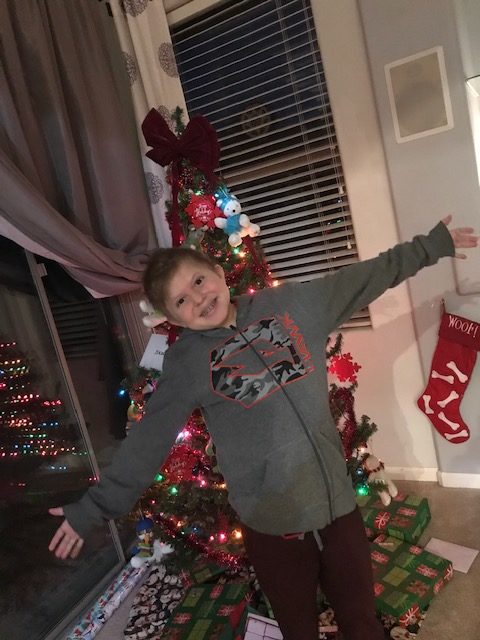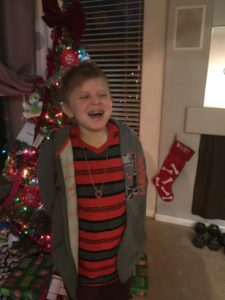
By Diana Nelson
Holiday cheer would not be possible without hope for the future. It’s that same brand of hope that was found this year in the family of Avery Ruiz, a 14-year-old student at Kyrene Middle School and a transplant survivor of dual-donated organs, a liver and a kidney.
Behind this tale of individual survival is Avery’s family—dad Greg, mom Adrian, brother Aidan— all of them a unified team whose persistence and unfailing support of Avery during his journey back to health helped them to arrive at this year’s holiday season.
“Fortunately, we have a completely different life now,” said Adrian, noting that hardly a day goes by that her son’s survival doesn’t cross her mind.
“Today, as we were heading to the neighbors for a little Christmas open house, Avery said, ‘Remember when we would have to rush home—leave early, so I could get on a machine?”
Of course the family remembers. “Yes, yes, we do,” she tells the others. “We remember having to leave early everywhere we went, and how Avery had to take numerous pills, experience so many hospital stays—along with life-threatening infections—and so many emergencies. Our wish is that no other family would have to endure these traumas.”
The difference this year is that the Ruiz family is filled with gratitude to the families who choose organ donation.
In the beginning
Avery was first diagnosed with serious health problems at only a month-old, recalls mom Adrian, who noticed that the baby had an extra-large abdomen.
“The pediatrician recommended emergency labs and an ultrasound,” she said, because she was suspicious of enlarged kidneys. “Because of the doctor’s concern, I immediately went into this dream-like state that I can recall to this day. The Winnie-the-Pooh graphics in the room swallowed me up, as this little baby of mine was now going to be whisked away.”
The results of the tests pointed to Autosomal Polycystic Kidney Disease with Chronic Hepatic Fibrosis, which is most likely caused by a chronic recessive gene trait.
“This diagnosis meant my husband and I carried a recessive gene for a disease that we showed no symptoms for, and neither did anyone in our family. Most likely, distant relatives were positive for the disease and had undiagnosed or untreated cardiac issues,” said Adrian.
“But we learned very quickly all about kidneys, and the connection between kidney and liver health.”
The first transplant
One day, after a shopping trip to Chandler mall, Adrian arrived home with Avery asleep in his stroller to find his favorite stuffed animal on the kitchen counter and a bag packed.
“We were told to go immediately to Phoenix Children’s Hospital, where Avery was first transplanted with a kidney from me,” said Adrian.
After the surgery, it was really the first time Avery ate any real food and he was a new, vibrant child at age four. But, regrettably, the transplanted kidney only lasted five years and 45 days.
“Avery came down with a rare form of rejection, called Autosomal Mediated Rejection. He lost the kidney and went on peritoneal dialysis for almost five years.
This was a bridge to what would become his second transplant in 2017.
More surgery for Avery
As the family was preparing for a second kidney transplant, with dad Greg being prepped to donate, Avery suddenly became ill in September 2017. He began bleeding in his intestinal tract and stomach. This became life threatening and the family soon learned he would need a dual-organ transplant of the kidney as well as a new liver—this because Avery’s type of kidney disease can also create clutters of cysts on the liver as well, which can damage both of the organs’ function.
Avery was in and out of the hospital for several months, missing much of his eighth-grade school year.
Said Avery’s mom:
 “He was a very sick boy but pushed through with dialysis four days each week. Avery would have to leave school three days per week and then spend most of every Saturday hooked up to a machine. It was heartbreaking and a disruption to a young boy just starting his teenage years. Dialysis is hard on anyone, especially children.”
“He was a very sick boy but pushed through with dialysis four days each week. Avery would have to leave school three days per week and then spend most of every Saturday hooked up to a machine. It was heartbreaking and a disruption to a young boy just starting his teenage years. Dialysis is hard on anyone, especially children.”
In December 2017, the family chose to seek care at a hospital in California near Stanford University.
“On April 12, we got a call from Stanford about a possible donor,” recalls Adrian. “Avery was not compatible with 95 percent of the population due to antibodies. The next day, we received the official word and were on a flight just after 8 a.m. that morning. We were scared to death, elated, relieved and also so unbelievably saddened that another family was going through the devastating loss of a loved one.”
But, through an unknown donor, Avery was given a second chance by receiving the gift of new organs.
A welcome home
Family members lived between home and California for nearly three months until July 3, when Avery returned home. He will always need to take medications to prevent rejection.
In addition, he suffers from a rare non-specific immune deficiency and must take infusions once per week. Still, his mother feels blessed by the support of strangers who donated the organs and others who give blood.
“Throughout everything, our best experience has been to meet other families who also received organ donations. It’s given us back Avery, who is a totally different kid and living life for the first time.”


